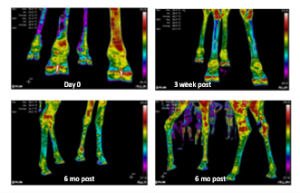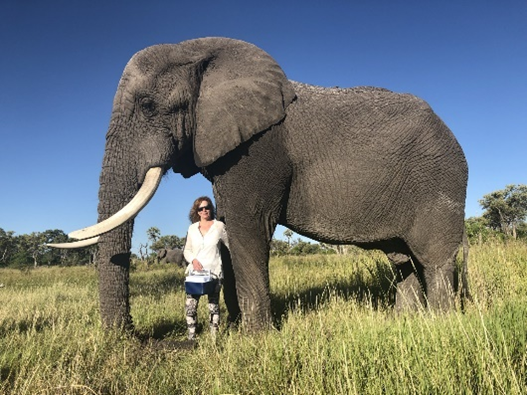Valerie Johnson
 Contact
Contact
john7670@msu.edu
Office: 517-884-2075
Lab: 517-884-2069
Departmental AFFILIATIONS
- Biomedical Engineering
About
Valerie Johnson is an assistant professor in the department of clinical sciences at the school of veterinary medicine. Her research focuses on the immunomodulatory and anti-infective properties of mesenchymal stem cells.
Dr. Johnson received her undergraduate degree at Boston University. She received her DVM from Tufts University and her PhD from Colorado State University. She is a diplomate of the American College of Veterinary Emergency and Critical Care and is residency trained in veterinary microbiology.
The Johnson Lab
Mesenchymal stem cells (MSCs) are multipotent cells derived from adult tissues such as bone marrow, fat and blood. These cells are well known for their anti-inflammatory and wound healing properties. Recent advances including work performed by our laboratory has demonstrated that these cells also have ani-infective properties and effect resolution of multidrug resistant infections. We have previously documented clinical efficacy of intravenous MSCs to ameliorate pain and lameness associated with osteoarthritis in dogs and a variety of other species.
Main projects
SAFETY AND EFFICACY OF MSC THERAPY FOR OSTEOARTHRITIS IN EXOTIC ANIMAL SPECIES
Many exotic animal species living under managed care conditions are living to advanced ages and suffering from age related osteoarthritis. Without the ability to perform joint replacement therapy and species differences in tolerance to anti-inflammatory and pain medication can make these animals very difficult to treat. Using thermal imaging cameras and inflammatory biomarkers we have been able to demonstrate that MSC therapy decreases inflammation and improves pain scores in a variety of species treated including giraffe, elephant, large felids, bears and many others.

Decreased inflammation in giraffe forelimbs following intravenous therapy with giraffe MSC as demonstrated by decreased red areas of increased heat intensity with thermography
MSC THERAPY TO TREAT HIGHLY FATAL ELEPHANT ENDOTHELIOTROPIC HERPESVIRUS
Elephants in the wild as well as elephants under managed care conditions are susceptible to infection with Elephant Endotheliotropic Herpesvirus (EEHV). Infections with high viral counts are often rapidly fatal to naïve elephants between the ages of 2-20 years old. Despite intensive monitoring and intensive care of these elephants mortality rate remains high. MSC therapy is a promising new therapy that stabilizes blood vessels and decreases inflammation and may have additional antiviral properties. Clinical trials utilizing MSC in EEHV infections in elephants are ongoing and have shown great promise.

LIVING BANDAGE FOR CHRONIC NONHEALING WOUNDS
Chronic wounds are prone to infection with multi-drug resistant (MDR) infections which can lead to loss of limb or even a life. New therapies harnessing the body’s innate ability to eradicate infection are needed as bacteria gain the ability to resist antibiotics faster than they can be produced. Harnessing the wound healing and antimicrobial effects of MSC we combine them with antibacterial and oxygen releasing nanoparticles with a barrier layer composed of skin cells derived from induced pluripotent stem cells to act as a living bandage for nonhealing or MDR infected wounds.

